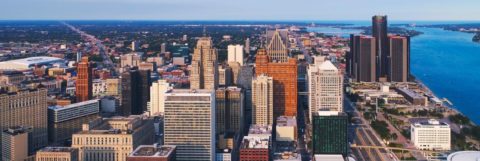Michigan Chronicle
Dec. 8, 2022
Rasha Almulaiki
The competition for funding and resources is often difficult for small businesses and non-profits especially when in a match against Detroit’s giant corporations.
The NeighborHUB Grant, administered in partnership between the Detroit Regional Chamber and General Motors, provides neighborhood stakeholders (nonprofits, block groups and small business owners) the freedom to drive and develop programs and places that specifically address needs and have the biggest impact.
Devon O’Reilly, senior director of community engagement and leadership development for the Detroit Regional Chamber, spoke to the Michigan Chronicle about what drives the success of the program.
“In collaboration with General Motors, we set out five years ago to create a grant program that was specifically designed to inject dollars into Detroit’s neighborhoods and particularly underserved neighborhoods in the city to support non-profits, initially. In the last few years, we’ve expanded the opportunity for small businesses.”
In partnership, General Motors (GM) and the Detroit Regional Chamber created NeighborHub, which aims to give grants to nonprofit organizations and small companies operating in neighborhoods in Detroit, Highland Park and Hamtramck.
Since 2018, NeighborHUB has awarded $500,000 in grants and provided advice and support services to awardees that are maintaining neighborhood-focused initiatives. The initiative has so far given 44 awards totaling more than $1 million to local groups and small companies that have built and improved places intended to encourage cooperation, effect change and have a beneficial influence on their communities.
O’Reilly said the diverse grant pool is representative of the residents and on the ground entrepreneurship at play in the city. Eight percent of the grantees chosen have been people of color and 64 percent of them being women-led or women-owned.
For the 2022 grant cycle, there were more than 200 applications submitted, and the selection process was very competitive. It was overseen by an advisory selection committee made up of Chamber and GM staff, previous NeighborHUB grantees, nonprofit founders and executives, and small business resource providers.
Applicants should have a community-development mindset in their proposal to improve on a neighborhood “hub” and consider anticipated expenses connected with activating and programming the area. Instead of receiving partial financing for a wider proposal, ideal ventures will concentrate on one particular aspect or program.
Small business grants should be utilized to upgrade the company’s infrastructure, including new or improved signs, new machinery, updated interiors, more delivery or mobility vehicles, bettering online operations, etc.
“There is a diversity also on what the grantees are funding,” said O’Reilly. “They’re repurposing vacant lots into park spaces and farmers markets, and creating community spaces, repurposing old churches. Using the funds to hold classes for tech activation such as computer labs and learning centers or mobile notaries. It’s really amazing to see the creativity and community commitment.”
A 2022 grantee, Detroit HIVES, put forth the community project of “The State Fair and Hoover Pollinator Parkway,” which will act as a hub for neighborhood services and as green infrastructure to alleviate climate inequity and pollinator and human food insecurity.
Grant recipients may ask for up to $30,000 (for non-profits) or $15,000 (for small businesses) to carry out their plans or advance their companies.
O’Reilly said the success metrics of the program are set by the business grantees to estimate what their scalable needs are in the application.
“We let the individuals tell us what success means to them. It could be the number of residents participating in a program or some businesses have measured success based on being able to hire or train local residents in their businesses.”
Outside direct grant money, DRC works with community organizations, such as Michigan Community Resources (MCR), to provide small businesses with additional operational and training support.
“This year, we are happy to say we’re working with the BUILD Institute,” said O’Reilly. “We are working it into the grant, so that grantees can have access to their workshops, classes and mentorship.”
The 2021-2022 non-profit awardees include: Bailey Park Congress of Communities, DetroitHives, PAL Recreation Center, Detroit Sound Conservancy, Motor City Grounds Crew, One Michigan for Immigrant Rights, Women of Banglatown and The Yunion.
Nine small businesses were also awarded this year: Always There Mobile Notary, Cutz Lounge The Grooming Shop, Detroit is Different – Online Magazine, Kidz Kingdom, Jo’s Gallery, Ladder 4 Wine Bar, Motor City GSD, Pingree Detroit and SMPLFD.
“We want to help these businesses grow and we want to help create more active neighborhoods and that means more successful businesses and neighborhoods, more successful nonprofits and activities,” said O’Reilly.
“We want to see activity and the funding we see in the greater Downtown area to happen in the neighborhoods as well. Every single neighborhood in Detroit has a chance and should have the ability to access these kinds of resources and have their stories voiced and known.”
To learn more about the community impact of NeighborHub Grant awardees, tune into “Detroiters Think Big: A Small Business Podcast” presented by Detroit Regional Chamber and General Motors.

